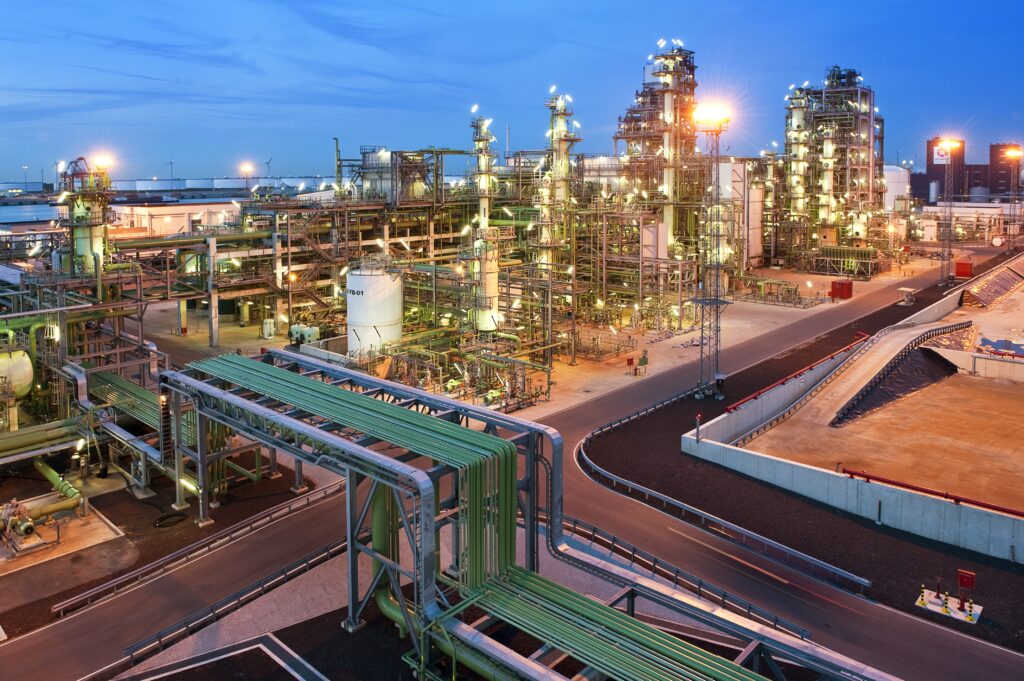Neste
Neste sees sustainable aviation fuel (SAF) as a key lever to decarbonise the aviation industry, with significant expansion planned for its Netherlands facility.
From early vision to global impact: Neste’s learnings for SAF production in Rotterdam from its evolution as a Finnish oil refiner to an international renewable fuels business
| KEY FACTS | |
|---|---|
| Location | Rotterdam, the Netherlands |
| Project stage | Operational – under expansion |
| Sector | Sustainable aviation |
| Customer | Offtake agreements with many airlines across the globe (Neste’s first SAF in 2011 was Lufthansa, which used it to fly between Frankfurt and Hamburg, conducting over 1,000 flights) |
| Total project investment | €2.5 billion |
| Jobs | 300 at Rotterdam refinery (after project commissioning). Globally, Neste employs 5,796 people |
| Capacity | The Rotterdam refinery can currently produce up to 500 ktpa of SAF and after the refinery expansion is complete, the SAF production capability will increase to 1.2 Mtpa |
| Key milestones | The first SAF production line was announced in April 2021, reached FID in June 2022 and started operation in April 2025. FID for the refinery expansion was announced in 2022, and production is expected to start in 2027. Neste was originally founded in 1948 to secure Finland’s oil supply, but has transformed to become a global leader in renewable and circular solutions. |
Founding vision
Neste began researching and developing renewable fuels in the 1990s, when renewable energy was far from mainstream and regulatory frameworks or support mechanisms were virtually nonexistent. It pioneered the technologies needed to turn renewable oils and fats into premium-quality renewable fuels, leading to the development of its proprietary NEXBTL™ technology.
As the market matured, Neste accelerated investments and launched commercial renewable diesel production in Porvoo, Finland, in 2007. New facilities in Singapore followed this in 2010, and in 2011, its Rotterdam facility opened.
The company’s early decision to invest in renewable fuels was driven by its strong vision, early predictions of the market potential and anticipation of supporting policy frameworks, leading Neste to believe that the transition to renewable fuels was inevitable.
There needs to be a point where you have the confidence for the market developing, to invest in the technology and build the skills. That is a matter of timing but also of courage.
— Hanna van Luijk
Rotterdam Site Director, Neste
Early-mover advantage
From a business perspective, developing alternative fuel technologies strengthened the company’s portfolio and the first-mover advantage was significant. Experience and expertise developed in one region could be transferred across geographies.
From a European perspective, recent geopolitical developments have underscored the importance of building core capabilities within Europe’s borders, making Rotterdam’s production expansion strategically relevant, as well as providing a significant investment into the economy of the Netherlands.
The importance of regulation and education across the market
In an industry with slim profit margins, voluntary uptake of sustainable aviation fuel (SAF) has not materialised in the way it might have been predicted a few years ago. While Neste pioneered developing renewable fuels and is currently expanding its production of sustainable aviation fuel (SAF) globally, regulation remains a critical enabler for the aviation industry’s transformation to net-zero carbon emissions by 2050. Today, there are still notable differences from continent to continent and the regulatory challenges are present at both ends of the production process. In the case of the raw materials, such as used cooking oil and animal fat waste that is processed to make hydroprocessed esters and fatty acids (HEFA) for SAF, raw material status and compliance is a key issue, with regulation and certification varying regionally. Updating these frameworks is essential for SAF and renewable diesel production.
For developers like Neste, engaging with local and national regulators is a core part of project execution and cooperation across the industry is essential. With rapid developments in the SAF marketplace over the past five years, sharing knowledge with stakeholders such as airlines, airports and regulators can be beneficial to all parties.
Neste has found that the education of potential customers is especially important, highlighting the emission reduction benefits of using SAF and ease of use in existing aircraft can accelerate stakeholder confidence and SAF adoption.
Investing for growth
Neste’s Rotterdam SAF project is a beneficiary of the allocation of proceeds of green debt instruments that span four eligible Neste assets and projects categorised under the International Capital Markets Association Green Bonds Principle class of eco-efficient and circular economy adoption products, product technologies and processes. As a global business with a significant shareholder in the Finnish State, Neste has been able to seek investment across its portfolio of renewable fuel projects rather than having to secure investment on an individual project by project basis.
Being in the port of Rotterdam, a European industrial and logistical hub, has also been beneficial to Neste.
We operate in the Port of Rotterdam, which is an attractive industrial cluster supporting us with the infrastructure, utilities, networks, people, resources, expertise and logistics.
— Hanna van Luijk
Rotterdam Site Director, Neste
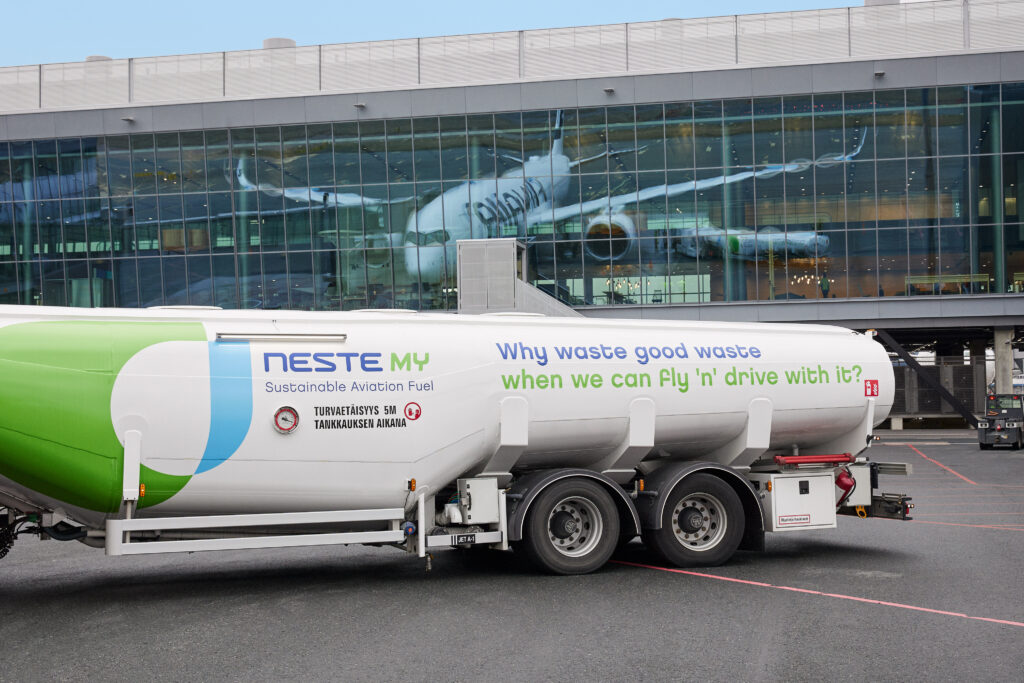
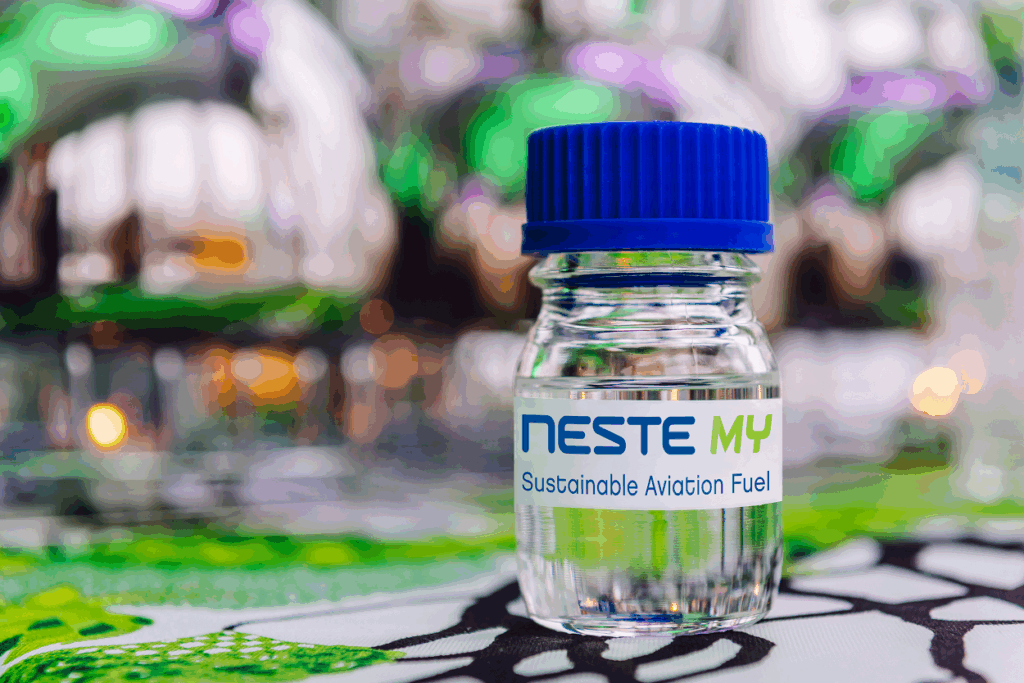
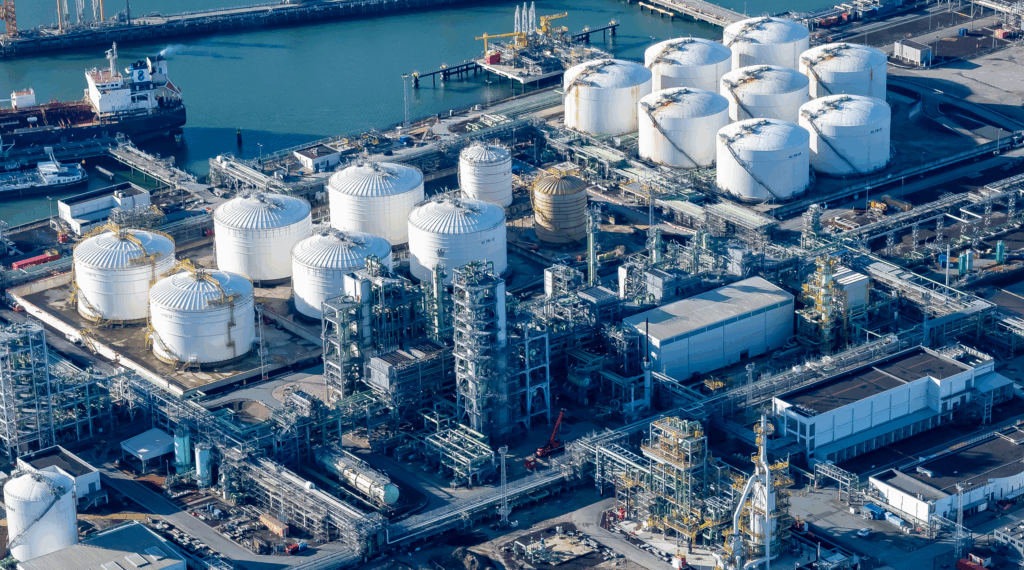
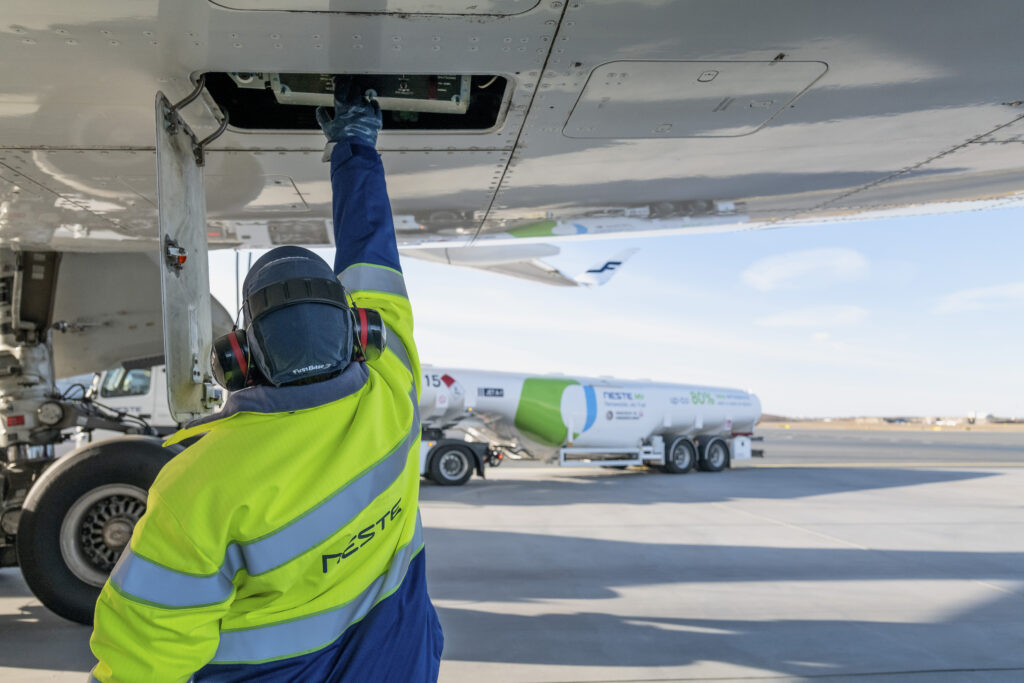
Refinery modification and enlargement
The Rotterdam modification and expansion illustrate the complexity and scale of implementing next-generation fuel production. Initially operating as a renewable diesel refinery from 2011, modifications to convert to SAF production began in 2021 and the site expansion construction in summer 2022. On the ground, more than 700 contractors have been involved, new land was acquired from neighbouring businesses along with a 25-hectare lot on the Port of Rotterdam, underscoring the project’s magnitude.
The new production line benefits from proximity to the existing facility, allowing for shared raw material supply chains, operational resources and on-site technical expertise. Neste also leveraged experience from its earlier expansion of its renewable fuels facility in Singapore (completed in 2023). A diversified raw materials pool supports both cost efficiency and availability, while site-specific pretreatment expertise can be replicated across locations.
Taking the decision is one thing, but from the investment decision to getting the product out takes quite a few years. So that period is also essential for being successful. Anyone can make big decisions, but it’s not a given that anyone will be successful in executing on those.
— Hanna van Luijk
Rotterdam Site Director, Neste
The Rotterdam expansion will increase Neste’s total renewable fuel production capacity from 1.4 Mtpa to 2.7 Mtpa by 2027. The current facility can produce up to 500 ktpa of SAF, while the new facility will add a further 700 ktpa. Production will remain flexible, balancing SAF and renewable diesel output in response to market conditions.
External validation
Neste knows that airlines and logistics businesses have set ambitious targets for greenhouse gas (GHG) emission reductions. To best position itself in the market and ensure credibility, Neste GHG emission reduction is calculated with established life-cycle assessment (LCA) methodologies, such as the CORSIA methodology. Using Neste’s SAF in unblended form would reduce GHG emissions by up to 80% over the fuel’s life cycle compared to using fossil jet fuel.
Neste sees the long-term opportunities with SAF but awareness of the product, its benefits and ease of use are still too low:
SAF is a drop-in solution that’s available at scale today. We have the ambitions and the solution, so it’s surprising that [the sector is] not moving faster.
— Hanna van Luijk
Rotterdam Site Director, Neste
